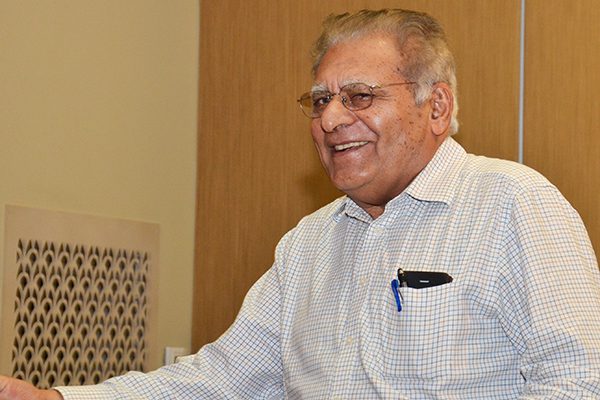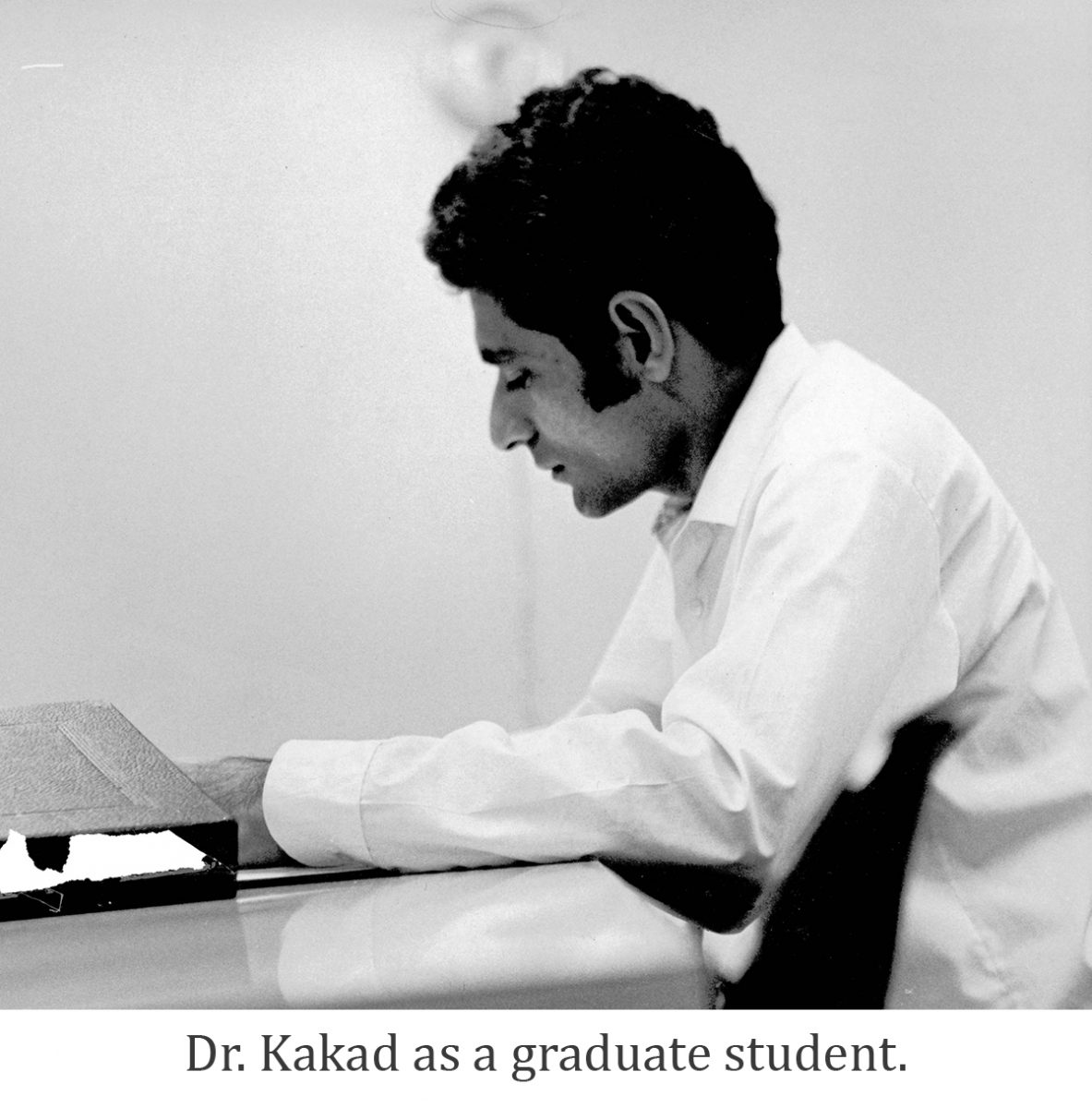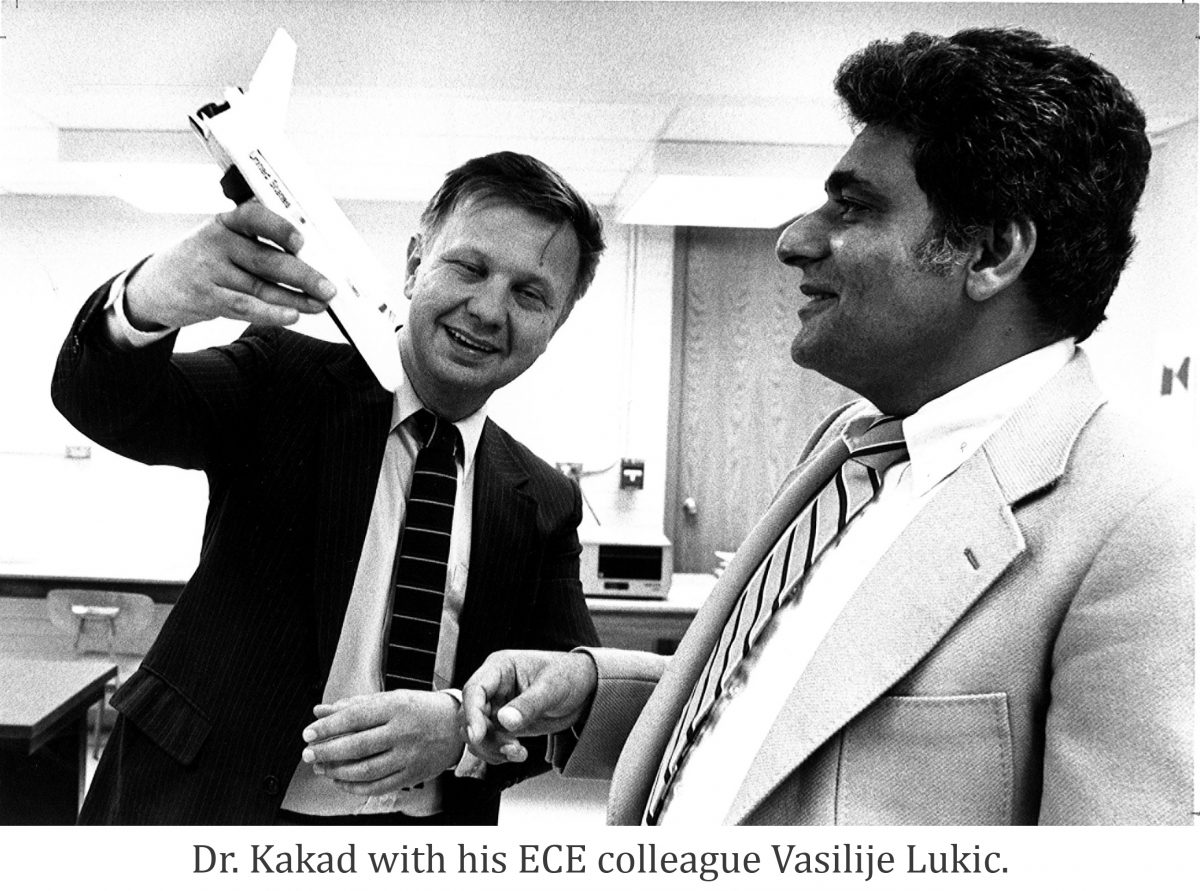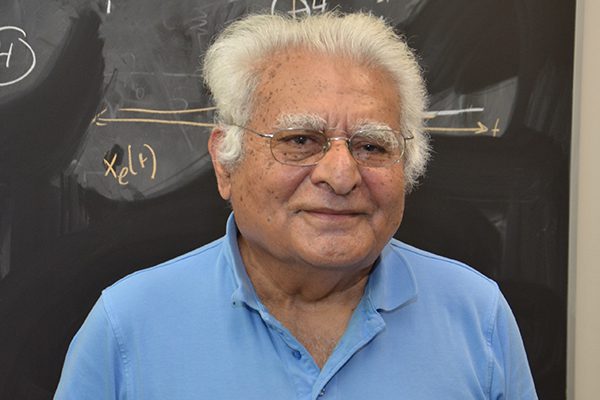After 45 Years at UNC Charlotte, Dr. Yogi Kakad Retires

When he graduated with his Ph.D. in 1975, Dr. Kakad was offered two jobs, one at UNC Charlotte and the other at a major research university. “I sat with my advisor at Florida and asked for his thoughts,” Dr. Kakad said. “He said ‘I’ll give you a piece of advice. Go to Charlotte. It’s an up-and-coming university. It’s going to be exciting. You’re going to be on the ground floor. You will develop the graduate programs, so go there.’ So, I came here to make a difference, to build a program.” Now, 45 years later, Dr. Yogi Kakad is retiring, and is thankful for the valuable advice he got all those years ago.
When he came to Charlotte in 1976, Dr. Kakad was an assistant professor in the department known as Engineering Analysis and Design. Over the years, the department became Electrical and Computer Engineering, and Dr. Kakad rose to the level of full professor. Currently the longest-serving faculty member in The Williams States Lee College of Engineering, Dr. Kakad is now finishing the final year of his three-year phased retirement. Upon retirement, he will transition to emeritus status, but still plans to be active on campus.
 When he arrived in Charlotte, he was the fifth person in the electrical engineering group, and the youngest. “I can remember a trip to the university library with Mr. Smith, a senior faculty member, when I first came,” he said. “Faculty could check out books for a year, and when Mr. Smith got his, the librarian told him the due date was a year away. When I checked out mine she said it was due in three weeks. I told her, ‘I’m not a student, I’m a faculty member.’ She made me show her my faculty ID.”
When he arrived in Charlotte, he was the fifth person in the electrical engineering group, and the youngest. “I can remember a trip to the university library with Mr. Smith, a senior faculty member, when I first came,” he said. “Faculty could check out books for a year, and when Mr. Smith got his, the librarian told him the due date was a year away. When I checked out mine she said it was due in three weeks. I told her, ‘I’m not a student, I’m a faculty member.’ She made me show her my faculty ID.”
The College of Engineering in the 1970s looked much different than it does today. The size of undergraduate classes at that time was about 14 students. Faculty taught the same class twice in a day, first in the morning and then during an evening session. Faculty also taught lab sections in addition to giving classroom lectures. And they did all the student advising and led the senior projects.
The student make-up was also different. Many of the students were first generation college students and many were Vietnam veterans. In addition, the ratio of female to male engineering students was much higher than it is now. “There were about five women in every class, out of a total of 14 to 15 students,” Dr. Kakad said.
In his early years at UNC Charlotte, Dr. Kakad was involved in the development of much of the electrical engineering curriculum. Many of the early classes he developed are still being taught today.
Dr. Kakad was also instrumental in starting UNC Charlotte’s graduate programs. “When I started here, the first Dean of the college, Dr. Barnett said ‘Son, we expect you to help develop the graduate programs here.’ And so, I was the first person in the engineering college to teach a graduate class. I also mentored the very first master’s thesis student at the University in 1980, as part of the Master’s of Science in Engineering program.”
The first Master’s engineering program started with 24 students, many of them employees from IBM, which had recently located a facility in Charlotte, and some who were Duke Power employees. All graduate classes were taught in the evening.
Following the start of the Master’s program, Dr. Kakad was heavily involved in the committees that developed the first Ph.D. programs, which were in Electrical Engineering, Mechanical Engineering, and Applied Mathematics.
 In support of the graduate programs, Dr. Kakad began helping the University build its research programs. “I was the first person here to win a federal grant,” he said. “It was for $30,000. The research office had just one person in it at the time, and she was so proud of me. Everything was much more personal in those days. You could get all the signatures you needed for a grant application in one day, by just walking from office to office. It was a very different time.”
In support of the graduate programs, Dr. Kakad began helping the University build its research programs. “I was the first person here to win a federal grant,” he said. “It was for $30,000. The research office had just one person in it at the time, and she was so proud of me. Everything was much more personal in those days. You could get all the signatures you needed for a grant application in one day, by just walking from office to office. It was a very different time.”
A key to the growing research on campus was the creation of the research centers, initially including the North Carolina Microelectronics Center and Center for Precision Metrology, and then in later years, the Energy Production and Infrastructure Center.
“The research centers were always evolving and that really helped us,” Dr. Kakad said. “I commend the University leadership in building these programs. We always seemed to have the right leaders at the right time. Dean Bob Snyder was instrumental in building the graduate programs and laid the foundation of research in the college. Dean Bob Johnson was a true visionary and, under the leadership of chancellors Woodward and Dubois, was able to implement his vision. When you look at growth of the programs, the construction of the buildings and the growth of campus, it is amazing to see what Dean Johnson helped accomplish.”
Over the years, Dr. Kakad was always active in university governance. “I served on every possible committee on campus,” he said. “They included course and curriculum committees, engineering graduate committees, Graduate Council, Faculty Council, twice as COE faculty president, and once as the University faculty president. I also served on the UNC Faculty Assembly in Chapel Hill level for seven years. I was on every committee you could think of and it was very rewarding.”
For UNC Charlotte’s future, Dr. Kakad sees the University progressing to a new level, led by its amazing faculty. “I’m really very proud of our young faculty now,” he said. “They are very impressive scholars. There are so many vibrant, bright people in our department. They have very high energy and enthusiasm. I commend all the colleagues in my department. They are very impressive to me.”
Working with UNC Charlotte’s students for the past 45 years has been an honor, Dr. Kakad said. He is especially proud of the accomplishments of his graduate students, and values the many wonderful experiences he had with them over the years.
“My graduate students have been my major reward. I was fortunate to have had excellent students at both the Master’s and Ph.D. levels. Many have gone on to do great things around the country. Their successes reflect the successes of UNC Charlotte. They are helping build a strong national reputation for our College.” A number of Dr. Kakad’s graduate students over the last 30 plus years are still in touch with him today.
 As he enters this new phase of retirement, Dr. Kakad hopes to continue the busy traveling schedule he used to have before COVID restrictions. He also hopes to spend more time with his family. “I have five grandchildren who keep me busy and I very much enjoy that.”
As he enters this new phase of retirement, Dr. Kakad hopes to continue the busy traveling schedule he used to have before COVID restrictions. He also hopes to spend more time with his family. “I have five grandchildren who keep me busy and I very much enjoy that.”
Retirement doesn’t mean he will end all involvement with UNC Charlotte, though. He will still be doing some research and completing a couple of research papers. He will also continue to serve on some doctoral committees.
“This has been my life, I can’t just completely walk away. UNCC is a part of me. Both of my children learned to walk on the old track here. I can’t see being without it. My ties are very strong. My roots are here. I will still be involved. I just won’t get paid.”
Dr. Kakad says he would also like to be a resource to young faculty, offering them guidance and perhaps some advice that they will still value 45 years later.
“The best advice I ever got was from my professor who encouraged me to come to UNC Charlotte. He was right. It has been very rewarding. I got to be part of very exciting times.”